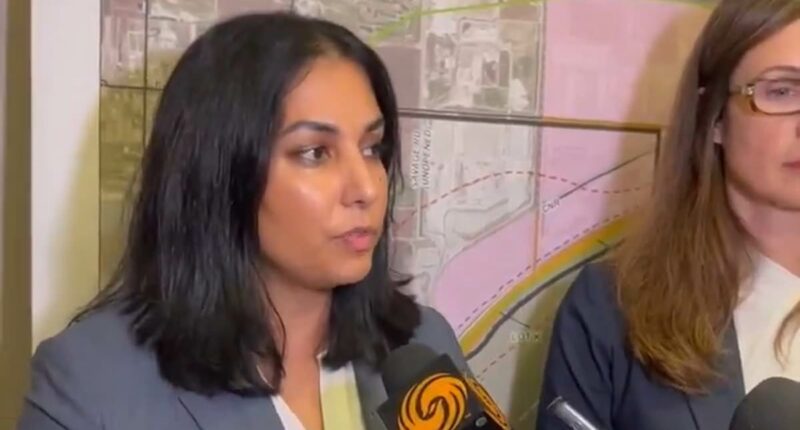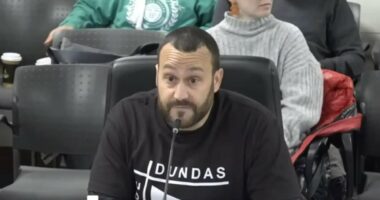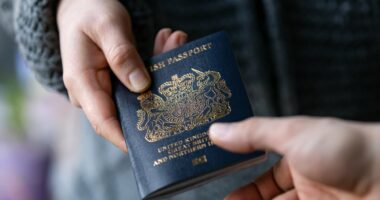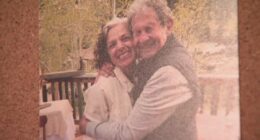Share this @internewscast.com
An assertive attorney general offered a firmly progressive response when questioned about transferring land to an indigenous tribe, a decision that could potentially affect others’ homes and businesses.
Nika Sharma, the Attorney General of British Columbia, Canada, addressed the issue with calm assurance, stating, “I want to emphasize that reconciliation is very important.”
Sharma is affiliated with the New Democratic Party, known for its left-leaning stance. Recently, the party stirred controversy with a mailer that referred to women as “non-males,” aiming to support transgender rights.
She addressed these concerns during an emergency meeting convened in Richmond on Tuesday to discuss the land transfer.
Sharma elaborated, “We collaborate with First Nations and communities throughout the province. Our goal is to unite efforts to resolve historical injustices and advance in a manner that honors all individuals.”
Her comments followed a decision by her and other officials to allocate 800 acres to Canada’s indigenous tribes.
Locals who’ve lived there for decades – many on private properties they’ve worked hard to buy – say they’re already having issued with their mortgages just weeks after the handover was announced.
But Sharma offered little comfort to those fearful of losing their homes and businesses during Tuesday’s meeting, despite those affected spending years or decades paying property taxes to the very same government that has now given their land away from under them.
‘It is our position as the government, that reconciliation is an important part of the work of the province and I think all British Columbians expect us to sit down at the table together and try to resolve issues that are important to them,’ she declared.
Locals are also frustrated by their alleged lack of representation during the aboriginal title legal proceedings, which lasted more than five years.

British Columbia Attorney General Niki Sharma doubled down on the importance of reconciliation at at Tuesday night town hall (pictured) when questioned about the impact the aboriginal title ruling has on private homeowners

The BC Supreme Court in August issued a ruling awarding over roughly 800 acres of land to Canada’s indigenous tribes. Pictured is a Richmond home that could be affected by the ruling
The August 2025 ruling, which followed what was billed the ‘longest trial in Canada’s history’, awarded the Cowichan tribes ownership of 800 acres of land along the Fraser River shoreline in the Vancouver suburb of Richmond.
The huge land parcel, which the tribes call the Lands of Tl’uqtinus, is currently home to private residents, small farms, a golf course and several industrial operations. It consists of land and buildings valued at more than $1.3billion, property analysts said.
The BC government and city of Richmond have both filed a notice of appeal in the case. Sharma and Richmond Mayor Malcolm Brodie have also urged a ‘higher court’ to reconsider the ruling.
Despite her commitment to the appeal, Sharma’s remarks at the town hall Tuesday night were met with criticism online.
She was accused of ‘avoidance’ and ‘throwing ‘legitimate’ land owners under the bus,’ as well as pushing ‘usual rhetoric and talking points.’
One outraged Canadian even went as far as accusing her of ‘using indigenous fronts to dismantle property rights, rewrite law, and gut the very concept of ownership that’s stood since the Magna Carta.’
The attorney general, in her own social media post, issued another woke defense of the same policy she allegedly opposed.
‘The fact is, you can respect Aboriginal title and protect private property. Minister Spencer Chandra Herbert BC NDP and I both know that,’ she wrote.

Hardworking farmer and lifelong Richmond resident Kal Mattu appeared before city leaders Tuesday night, outraged after learning his home could soon fall under Cowichan title

Mattu, who has lived in Richmond for 51 years, owns a farm in the impacted Triangle Rd area of Richmond. His property was valued at $1.6 million in 2023, Redfin records show
Sharma highlighted how the BC government was ‘first to announce’ an appeal and reiterated that ‘we strongly disagree with the court’s treatment of private property in this case.’
‘But even as this case continues, we know lasting solutions are found through dialogue and collaboration with our First Nations partners,’ she continued. ‘That’s how we bring stability and certainty to our province.’
The aboriginal title declaration was suspended for 18 months so that the tribes, federal government and city would have the ‘opportunity to make the necessary arrangements.’
But locals are frustrated by the ruling and believe the city, its lawyers and leadership left them in the dark throughout the legal process.
Action on the aboriginal title case commenced in March 2014 and the trial began in September 2019. Residents allege they only received formal notice about the case after BC Justice Barbara Fisher issued her ruling in August 2025.
‘You guys knew what was going on. Why did you not reach out to us?’ lifelong Richmond resident Kip Mattu questioned Brodie at Tuesday night’s heated town hall, The Globe & Mail reported.
‘You’re the mayor. You’re supposed to know everything that’s going on in Richmond. I pay my taxes to you. Why did you not reach out to us?’
Brodie and city solicitor Anthony Capuccinello Iraci claimed officials asked the court to notify affected homeowners, but the request was rejected.

Sharma (pictured) said her government is working with First Nations, city and provincial leadership, and residents to find ‘resolutions to sort through past wrongs and move forward in a way that respects all people’
Capuccinello Iraci argued landowners suffered a ‘tremendous injustice’ and ‘denial of fair process,’ which he said will be highlighted in the city’s appeal.
Their responses, however, do not calm the fears of outraged residents like Mattu.
‘I have owned my land for more than enough years to know what’s mine. I’m not giving it up without a fight,’ he told Juno News.
Mattu, who has lived in Richmond for 51 years and currently owns a $1.6 million ($1.15 millions USD) blueberry farm, alleged the bank has now refused to renew his mortgage in wake of the ruling.
‘I paid taxes. I bought my place –– and low and behold, I don’t own my place. It’s not fair,’ he said, adding that he feels as if he has been paying taxes for ‘no reason at all.’
He added that he just wants to ‘keep what I paid for’, is pursuing legal action and believes homeowners should have been better represented during the legal process.
Nearly all of British Columbia is unceded tribal land and the Cowichan tribes have already filed an appeal claiming ownership of further land in the region, meaning more properties could potentially be included in a future handover.
David Rosenberg, the lawyer representing the Cowichan tribes in the aboriginal title case, alleged his clients are not targeting private property. He added that he is ‘frustrated and disappointed’ with the ‘misinformation’ surrounding the ruling.

The British Columbia Supreme Court in August awarded the Cowichan Tribes an Aboriginal title over roughly 800 acres of land in the Vancouver suburb of Richmond. The Cowichan tribes have already filed an appeal claiming ownership of further land in the region

The August 2025 ruling awarded the Cowichan ownership of an area the tribe calls the Lands of Tl’uqtinus. Pictured is Cowichan Tribes Chief Sulsulxumaat Cindy Daniels
Rosenberg said the Cowichan ‘stands with the land owners’ and are empathic to them, Construct Connect reported.
He also alleged the tribes are frustrated by ‘inactivity’ from the British Columbia government and urged officials to ‘negotiate honorably’ with the Cowichan on how to reconcile private land that they have now been granted ownership of.
He added that if the province negotiates in good faith, the ‘likely outcome’ will be a treaty that recognizes the aboriginal title and also allows private owners to hold fee-simple title.
Chiefs from the First Nations on Vancouver Island also released a statement to the Vancouver Sun on Monday, alleging the response to the aboriginal title is ‘provoking unnecessary fear.’
‘We do not wish to deepen division. We are here to build a just future based on truth and reconciliation. One where British Columbia upholds its constitutional obligations,’ Lyackson First Nation Chief Shana Thomas said.
Chief Pam Jack of the Penelakut Tribe, echoing Thomas’s remark, suggested that private land owners should direct their frustrations at the provincial government.
‘We welcome and anticipate supporting individual landowners making any respectful claims they may have against British Columbia,’ Jack added.

The British Columbia Supreme Court awarded the Cowichan Tribes an Aboriginal title over roughly 800 acres of land in the city of Richmond (pictured), a suburb of Vancouver, in August
The Cowichan tribes were displaced from the so-called Lands of Tl’uqtinus in the mid-1800s when the British colonized the area.
British Columbia ultimately became a Canadian province and land in the historical Cowichen territory was sold over the years.
The tribes wanted to have ownership of the land returned to them, but did not seek for titles of privately held properties to be declared invalid.
The BC Supreme Court, however, ruled in August 2025 decision that granting private property ownership rights would ‘unjustifiably infringe’ on Cowichan Aboriginal title.
The court further ruled that issues surrounding titles would need to be resolved through negotiation, litigation or purchase, otherwise the properties would remain under Cowichan title lands.








